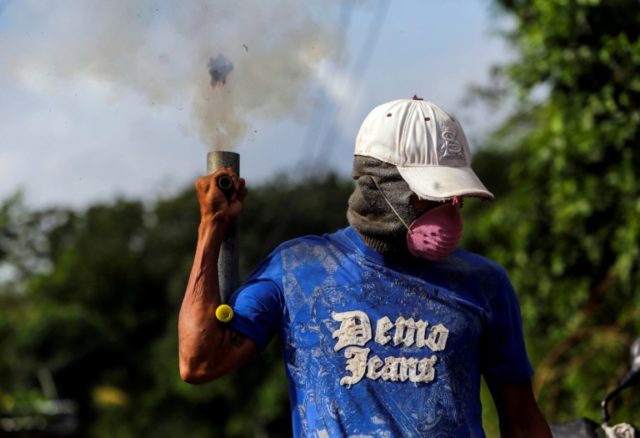Masaya (Nicaragua) (AFP) – “No smoking” signs dot a forested enclave outside Nicaragua’s flashpoint city Masaya, but tobacco is not the concern: the area harbors explosive material used to fashion homemade mortar rounds.
Demand for the makeshift shells has jumped in recent weeks as anti-government protesters seek to fend off President Daniel Ortega’s riot police, who are accused of unleashing deadly violence as the Central American country faces a sociopolitical crisis.
In the clandestine outpost, a man sporting sunglasses and an azure-blue face protector hand-mixes the mortar bombs, a concoction of potassium chlorate with carbon, sulfur, aluminum and a bit of sand for weight.
“We’re living in a critical moment,” he says, refusing to give his name for security reasons. That same day a Nicaraguan rights group announced that a 19-year-old student had been shot and killed, the 135th death linked to the unrest that has gripped the country since April 18.
Speaking from the makeshift workshop he dubs “Monimbo Makers” — named after the Masaya neighborhood that championed the rebellion that brought Ortega to power, but where residents are now turning on the leftist ruler — he says mortars are a form of protest and self-defense that “don’t leave mortal wounds.”
“This is a way to protect ourselves during this struggle,” he says.
– ‘Resist the massacre’ –
Opponents of the Ortega government deploy the mortar rounds by slipping them into light muzzleloader-style launchers, which are also generally handmade, and setting them alight.
Masaya mechanic Alvaro Torres and his neighbors craft the launchers using tubes and soldering equipment. Their collaborative effort was “organized on the block to help resist the massacre of these people,” he says.
The mortars help “repel the enemy,” the 47-year-old says. Making mortars — each one requires about an hour to produce, he says — is vital “to being prepared.”
The devices are mostly used as a scare tactic; when lit, mortar rounds explode almost immediately, emitting smoke and an impressive, concussive blast.
Getting hit with mortar shells could hurt, concedes a 20-year-old known simply as “El Fox.” But they are meant not to be lethal, intended rather to push government forces back from the street barricades manned by protesters.
Mortar wounds consist “of a burn, or a cut, but it’s not deadly,” El Fox said.
The Masaya resident said protesters are ultimately fighting an asymmetric battle, anyway: “Police carry AKs; they carry shotguns.”
“They are the only ones who have access to weapons,” he says. “The people have been able to repel them with stones, Molotov cocktails and mortars — with the only things we can use to fight.”
– Peace, not war –
Twelve mortar rounds normally go for 400 to 450 cordobas ($12 to $14), but prices have been rising since the government clamped down on gunpowder sales — causing the homemade market to burgeon.
What’s more, the craftsman at “Monimbo Makers” says, the companies selling chemicals needed for the homemade rounds have been closed, making it hard to procure ingredients.
But he will keep trying, he says, because the mortars are a way to drive security forces back and help the protesters in their pursuit of “peace in Nicaragua — not war.”
Similarly, Torres says, “the nature of the movement” will determine how long he keeps crafting mortar launchers.
“In the end, I believe that each person will have to carry one,” he says, to achieve a simple objective: “defending ourselves until this is over.”

COMMENTS
Please let us know if you're having issues with commenting.